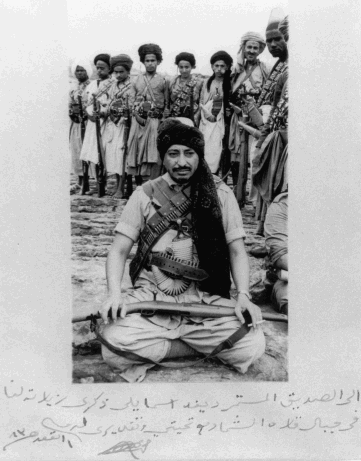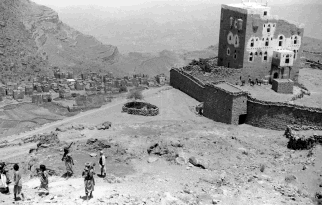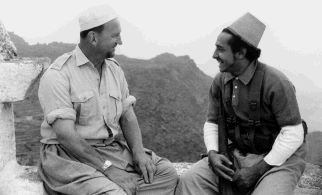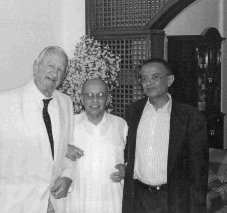Colonel David Smiley: A Tribute
Bernard Mills
Major Bernard Mills CBE has been a member of the Society since its formation in 1993. After retiring from the British Army he served, under the aegis of Colonel Smiley, as a military adviser to Royalist forces in Yemen.
David Smiley, who died on 9 January 2009 aged 93, was born in 1916 and was commissioned into the Royal Horse Guards (The Blues) in 1936. During the Second World War he served initially as a regular soldier with his Regiment before being seconded to Special Force duties in Ethiopia; later, with SOE, he was parachuted behind enemy lines into Albania; and, in 1945, into Thailand and Indo-China with Force 136. He emerged from the war highly decorated for bravery and with a notable reputation for irregular soldiering. Two people who served with him in Albania were to influence his role in Yemen: the first his life-long friend, Lt. Col. (Billy) McLean MP; and the second, Julian Amery MP, who later became Minister for War in the Conservative government. In 1958, on Amery’s recommendation, David was appointed Commander of the Sultan of Oman’s Armed Forces at the time of the Jebel Akhdar campaign to dislodge tribes loyal to the rebel Imam, Ghalib bin Ali. David’s successful three year tour in Oman brought him back into the field of guerrilla warfare but this time as the hunter rather than the hunted.
The conjunction of three events led to David’s involvement in Yemen: the overthrow of Imam Muhammad al-Badr by Republican officers in an Egyptian-backed coup in September 1962; a visit by Lt. Col. McLean to Saudi Arabia; and David’s decision to retire from the British Army at the end of his tour in Oman. The arrival of the fugitive Imam in the Saudi border township of Jizan, and his appeal to the Saudis for help, led Crown Prince Faisal to ask McLean to go to Yemen to report on the situation there and on the degree of support which the Imam was getting from the tribes in the North West and East of the country against Republican/Egyptian forces. On the strength of his visit to Yemen and his vigorous representations to Conservative leaders, McLean was able to persuade the British government to withhold recognition from the Republican government.

|
The inscription reads: ‘To our friend Mr David Smiley, a memento of his visit to us in the mountains of Qara, with my greetings and esteem – Imam Muhammad al-Badr’ |
A cabal of Julian Amery, McLean and David Stirling, the wartime founder of the SAS, set about providing practical as well as political support to the Imam. David was pulled out of retirement by Amery to help organise a small group of British ex-servicemen to advise and operationally assist the Imam and Royalist Princes. Some French and Belgian mercenaries were also recruited to provide military training to the Royalist tribes. The finance, arms and ammunition for this operation were to come largely, if indirectly, from the Saudis.
On 14 June 1963 David set out on the first of the nine trips he was to make to Yemen over the next four years, criss-crossing the country’s mountainous and harshly beautiful terrain on long journeys, more often than not on foot and alone except for the two or three tribesmen accompanying him as guides and bodyguards. This in itself for a near fifty year old would have been a triumph of mind over body; but bearing in mind the daily danger of air attack, the proximity of Egyptian and Republican positions to his routes, and the risk of kidnap by venal tribesmen, it was indicative of his great courage. Despite the large reward for his death or capture, David was never betrayed or put at risk by his Yemeni companions.

|
Amir Hassan bin Hassan’s headquarters, Jebel Ahanoum, 1963 |
David’s first visit was to the Imam at Qara in NorthWest Yemen where Muhammad al-Badr had set up his HQ. David also visited two of the Princes fighting on the Western front line before making his provisional report to the Imam, which he later repeated to Crown Prince Faisal in Riyadh. In this he drew attention to three basic Royalist failures: first in tactics because they were attempting to attack towns when they should have been ambushing, mining and cutting the Egyptians’ long lines of communication; second – the complete lack of coordination between the Princes in command of the royalist armies due to the lack of a radio net; and third – the chaotic supply chain.
David’s second tripto Yemen was in November1963, bywhichtimethe British, French and Belgian advisers whom he had asked for, with a view to setting up a radio net and to training tribesmen in the use of heavy weapons, had been recruited and were in place with the Imam and with some of the Princes in the front line sectors. His third trip in March 1964 to the North West was to witness the complete failure of Princes Abdullah Hussain and Muhammad Isma’il to capture the important town of Hajja due to bad planning and lack of coordination. The Royalists were forced to retreat leaving a number of scarce heavy weapons to fall into the hands of the Republicans. David’s report to the Imam on this debacle was critically blunt; he once again stressed the importance of attacking lines of communication, isolated camps and ambushing convoys, and the futility of set piece attacks on towns which tribesmen were incapable of sustaining.

|
David Smiley with Amir Hassan bin Hassan on the roof of the latter’s headquarters on Jebel Ahanoum, 1963. |
David’s fourth trip in March 1965 saw some success for his ideas. Prince Muhammad bin Hussain, the Royalist commander in the North East, had identified at Humeidat a narrow gorge which controlled the only road route from Sana’a to the Eastern provinces where there was a sizeable Egyptian garrison of some 10, 000 men. This was successfully taken on 14 April 1965, and, despite a determined counter-attack by Egyptian parachutists and commandos a month later, was tenaciously held with the support of tribesmen led by Prince Muhammad. The gorge remained under Royalist control until the end of the civil war, and the stranglehold on the land route and the difficulty of air supply was one of the main reasons for President Nasser’s two visits to Saudi Arabia during that year to discuss Egyptian withdrawal from Yemen.
It was at the end of this visit to the region that David was given command of all foreign advisers in Yemen. But this was, in effect, a nominal appointment since the advisers, generally, had little influence on the way the war was run although they did give valuable technical support; the Princes did what they wanted to do with little coordination between themselves and often in pursuit of personal or factional interest; and the influence of the Imam on the conduct of the war was minimal. However, the good relationship which David and Billy McLean had with the Saudis, and their consequent access to Saudi money and arms enabled them to motivate the actions of individual Princes, especially Muhammad bin Hussain.
David made two more visits to Yemen in 1965, a year which saw little military activity, a partial cease-fire being in force, but a great deal of diplomatic activity including the Jeddah Conference of August that year between President Nasser and King (as he had now become) Faisal at which the former agreed a phased withdrawal of Egyptian forces from Yemen in return for a cessation of Saudi aid to the Royalists. It was also agreed that a conference between the Royalists and Republicans should be convened at Haradh in November to discuss the formation of an interim government pending a plebiscite to be held before November 1966. David attended the Haradh conference as a correspondent for The DailyTelegraph until he was warned by the Saudis that his life was at risk there. The conference eventually broke up without achieving any agreement.
In February 1966 the British Government (now under the Labour Party) published a Defence White Paper announcing its intention to withdraw its armed forces from South Arabia in 1968. This immediately changed Egyptian plans: the cease-fire was broken, the withdrawal of Egyptian forces stopped, and Nasser announced that he was willing to stay twenty years in Yemen if that was necessary to preserve the Republic.
David shared with most of the British advisers in Yemen a sense of both astonishment and betrayal at the British government’s action. He had helped the Royalists achieve an almost unbelievable victory over the Egyptians (at Humeidat), which could have aided the survival of the fledgling Federation of South Arabia. After this devastating blow, David and his British colleagues remained in the field more out of loyalty to the Royalist Princes and their tribal supporters than in any real belief that the situation could be salvaged.
Having been appointed a Gentleman-at-Arms in Her Majesty’s Bodyguard in January 1966, David had told Prince Sultan in Riyadh that he would not be able to renew his contract nor his command of the foreign advisers but would be available for ad hoc visits to Yemen in future if required.
The next two years were to be a very unsettled period for all parties to the Civil War, with the Republicans engulfed by a power struggle between President Sallal and General Hassan al-Amri; with the various branches of the Bayt Hamid-ud-Din competing for succession to the Imamate, Prince Muhammad bin Hussain being the most likely candidate; and last but not least, the debacle of Egypt in the six day war with Israel in June 1967.
David’s last visit to Royalist Yemen was to be an arduous ten day trek in November 1967 through Arhab and Nihm across the Sana’a/Sa’da road to Heimatain and back to the Royalist HQ in the Jawf at Amara. He returned to Britain at the end of that month thinking his travels to Yemen were finally over. David retired from any further irregular soldiering to live quietly with his wife Moy, his loyal supporter in all his adventures, first on their farm in Spain and later in London.
David always kept up contacts with his Arab friends, and it was a great delight and surprise for him to be invited by Dr Abdul Karim al-Iryani to visit Sana’a as the guest of the government in February 2003. The purpose of the visit was for David to brief Yemeni historians and senior military officials on his role with the Royalists in the civil war and on his understanding of the politics and tactics of the Royalist commanders. The visit was a great success and an excellent example of the warm relations which now exist between Yemen and Britain.
Hallmarks of David Smiley’s personal and military distinction were his exceptional bravery, his integrity, and his loyalty to family and friends. He was much loved by those of his fellow countrymen who knew him, and won the esteem and affection of the manyAlbanians, Omanis and Yemenis who crossed his path.

|
Colonel Smiley with Dr Abdul Karim Al-Iryani (centre) and Dr Abdulla AbdulWali Nasher, Sana’a. 2003. |
